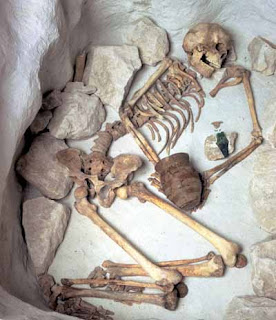I was very pleased to see the news headlines last week that a new study of prehistoric DNA appears to suggest that "at least 90% of the ancestry of Britons was replaced by a wave of migrants who arrived about 4,500 years ago" [the Guardian].
In the
earlier 20th century, it used to be thought that 'Beaker pottery' represented
a particular type of artefact belonging to an aggressive, colonising people who swept across Europe from the east bringing knowledge of
metalworking with them: hence reference in the contemporary archaeological literature of the
‘Beaker Folk’.
Using a traditional approach to archaeological artefacts, of course, it
is easy to argue that Beaker assemblages are the physical manifestation of a
specific ethnic group, and most early attempts at explaining cultural change
interpreted the arrival such material in terms of an invasion or folk
migration. The invasion hypothesis was very popular in the years leading up to
the Second World War and archaeological maps drawn throughout the
1930s, purporting to show the distribution of Beakers and the spread of
metalworking across Europe, look instead as if they are plotting carefully
planned military advances. Directional arrows became the march of armoured
regiments. Artefacts were weapons. Site names became battlefields.
This
view of aggressive acculturation underwent a gradual process of revision
throughout the 1960s and ‘70s. The ‘New Archaeologies’ that evolved during that
period stepped away from the invasion hypothesis, which appeared to provide a
rather simplistic take on the evidence, and progressively replaced it with ever
more subtle concepts. The arrival of Beakers and metalwork, it was argued, was
due to a more passive form of cultural change. To put it simply, it was
suggested that people altered their lifestyles through choice, and not because
they were forced to. Change, it was argued, occurred through peaceful social
interaction, such as trade. There was no need to explain the Beaker phenomenon
in terms of war, migration or conquest.
Never being entirely convinced by
all this, I did argue (in the books Monuments of the British Neolithic, The
Early Neolithic Architecture of the South Downs and Prehistoric Sussex) that
the so-called Beaker package "could easily (and quite plausibly) represent
the archaeological trace of an invasion or migration – the durable remains of a
small, militarily strong social group that replaced the social elite in a given
area, taking ultimate control of local resources". This point (in particular)
received a barrage of criticism in the reviews that followed, one writer (who
still works in archaeology) describing the argument as "complete
nonsense" - little more than "meaningless posturing" whilst
another noted that they were "writhing in annoyance at the crass images
drawn" and hoped that both myself and my books would "soon be
forgotten".
At the time, such 'reviews' left
me depressed and angry, not least of all because it was clear that those
writing the comments appeared to have wilfully misunderstood large sections of the books condemning the conclusions as they went against their own (wholly
subjective) point of view. Today, with the considerable benefit of hindsight,
I've learnt to recognise that if I'm annoying people quite this much then I
must, after all, be doing something right.
The news that the Beaker
phenomenon could indeed have been the result of prehistoric mass migration and
invasion, the degree of population replacement involved being far higher than
anyone could have imagined, has pleased me inordinately.
Even taking the hyperbole that always
surrounds archaeological discoveries (especially when reported in the popular
press), I do sincerely hope that the academics who have long argued against the
idea of population movement being the catalyst for cultural change are now
chewing on their crayons in frustration.
Now, if you'll excuse me I'm off
for a spot of meaningless posturing...




Who wrote those awful book reviews? Tell us tell us we want to know!
ReplyDeleteHa, that would indeed be telling (!) They know who they (as do I) and it's all a matter of public record, if you dig deep enough (an appropriate metaphor) on the net. I think it was JFK who said (what has to be one of my all time favourite quotes): "Forgive your enemies, but never forget their names" - indeed :)
DeleteThis comment has been removed by the author.
ReplyDelete